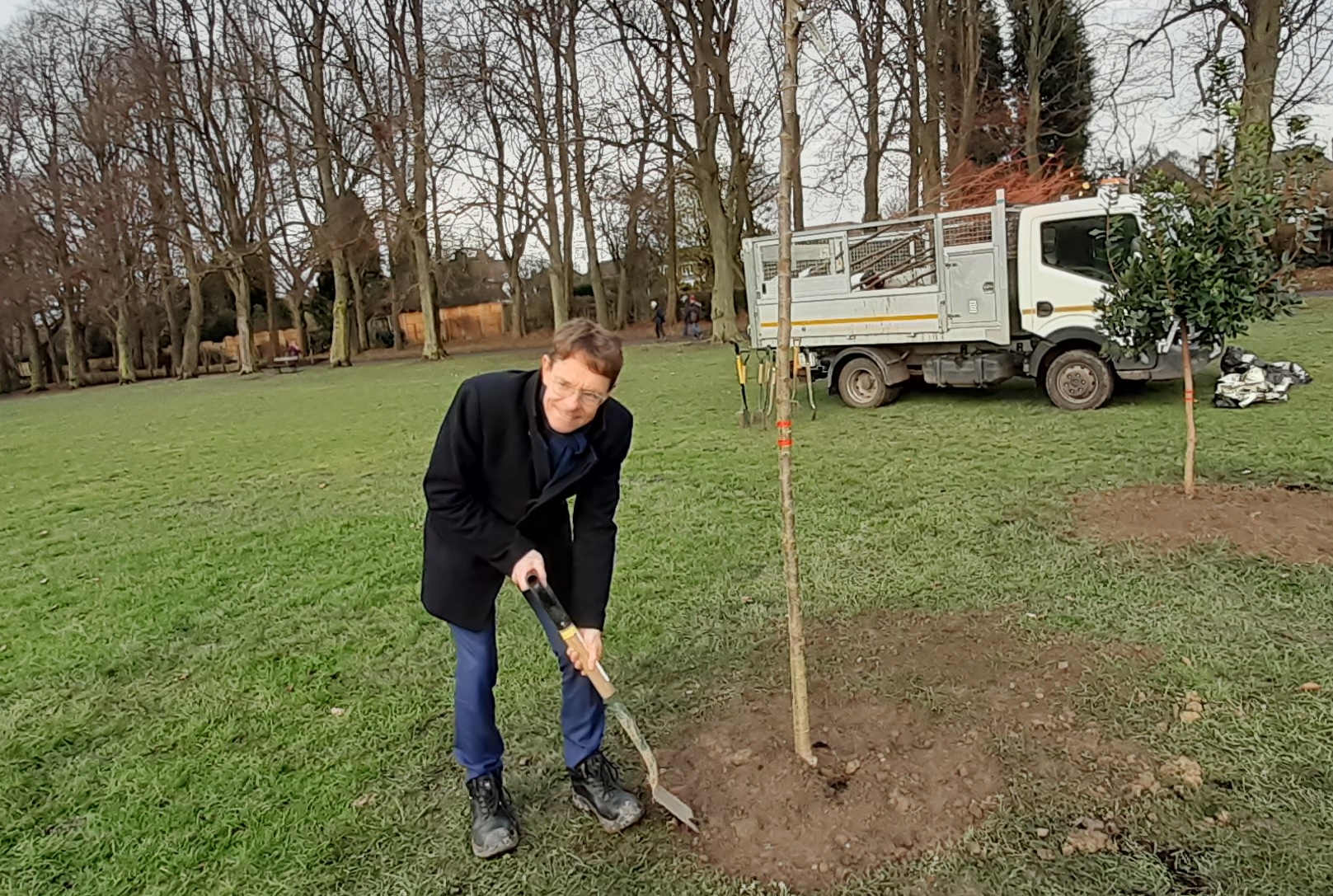Draft action plan shows how region can reach net zero carbon by 2041 and create thousands of new jobs
Published: Wednesday 03 Feb 2021
The West Midlands can achieve its ambitious target of becoming net zero carbon by 2041 and create thousands of new jobs if the region pulls together to tackle climate change.
Independent experts commissioned by the West Midlands Combined Authority (WMCA) have outlined a draft five-year roadmap to 2026 which if adopted will also bring major improvements to the economy and people's quality of life.
The scale of the challenge - as well as the economic, social and environmental opportunities it can bring - have been set out in the proposed WMCA #WM2041 Five Year Plan.

Andy Street, Mayor of the West Midlands planting a cherry tree in Walsall Arboretum in 2020
The Plan outlines the action needed to drive a cut in carbon of around 25% by 2026, the reduction needed to keep the region on course to meet the 2041 target and accelerate a green and inclusive economic recovery.
Conducted by independent consultants WSP the draft plan admits that this target reduction will be tough to reach but the WMCA believes it is achievable if everyone in the region - councils, businesses, government and members of the public - play their part.
The research also found that more than 21,000 new jobs could be created over the next five years, and 92,000 by 2041, mostly in new carbon cutting green industries and technologies.
Andy Street, Mayor of the West Midlands said: This marks a significant step closer towards achieving our goal of net zero by 2041.
When we set our target last year, we were honest about the scale of change that lay ahead. But with the publication of this plan, we are also outlining the enormous opportunity that the transition to net zero presents for our region. Up to 92,000 jobs could be created in new green industries across all our economic sectors - construction, manufacturing, transport, hospitality - all stand to benefit from this transformational effort.
This is what makes it so important that our journey to net zero involves the whole region. Public, private and third sectors will all need to work together, and we have made sure to consult them thoroughly on the creation of this plan. I am ambitious that we can deliver the scale of change required to reach this target and I am excited by the opportunities presented by it
Cllr Ian Courts, Leader of Solihull Council and WMCA portfolio lead for energy and environment, added: We knew that achieving net zero by 2041 was a bold and ambitious statement for the region to make.
We need to be clear about the sheer scale of this challenge but also the significant economic opportunities it offers, so that we can rise to it. This plan shows how by working together we can do just that
The draft Five-Year Plan identifies where and how the region needs to invest in carbon cutting projects and what new policies will be needed to reach the 2041 net zero carbon target.
However, significant investment will be required, approximately £4.7bn in the first five years and £15.4bn by 2041.
The Five Year Plan builds on the projects and proposals already drawn up across the West Midlands including:
• Retrofitting thousands of homes to make them more energy efficient - helping to tackle fuel poverty in the process.
‚Ä¢ A Zero Carbon Homes Charter setting out how all new homes built in the region from 2025 onwards can be ‘zero carbon ready'.
• The upgrade of the region's bus fleet to zero-emission vehicles, including Coventry becoming an all-electric bus city by 2025 and 20 new hydrogen powered double-deckers to run on the new Sprint route from next year.
• An ambitious tree-planting programme including one tree planted for each resident, and plans for a national park, building on the work of Birmingham City University.
The Plan also focuses on working with the region's businesses and education and training institutions to give local people the skills to work in the new green industries.
Other opportunities are expected to be generated by a rapid growth in electric and autonomous vehicles with the West Midlands already seen as a UK leader in their research and development as well as their manufacture.
The proposed Five Year Plan, which will go before the WMCA board on March 19, builds on the existing #WM2041 commitment and the region's strategy for a green recovery, WM2041: A Programme for Implementing an Environmental Recovery which was agreed by regional leaders last June. The WMCA's target would create a zero carbon West Midlands by 2041- nine years before the government's national target of 2050.
If approved by the WMCA Board the Plan will continue to be updated to factor in new knowledge and policies to keep it at the forefront of technological development.
A citizens panel is also planned so a wide range of residents can shape the work.
The 2041 net zero carbon target is based on work by climate research organisation the Tyndall Centre.